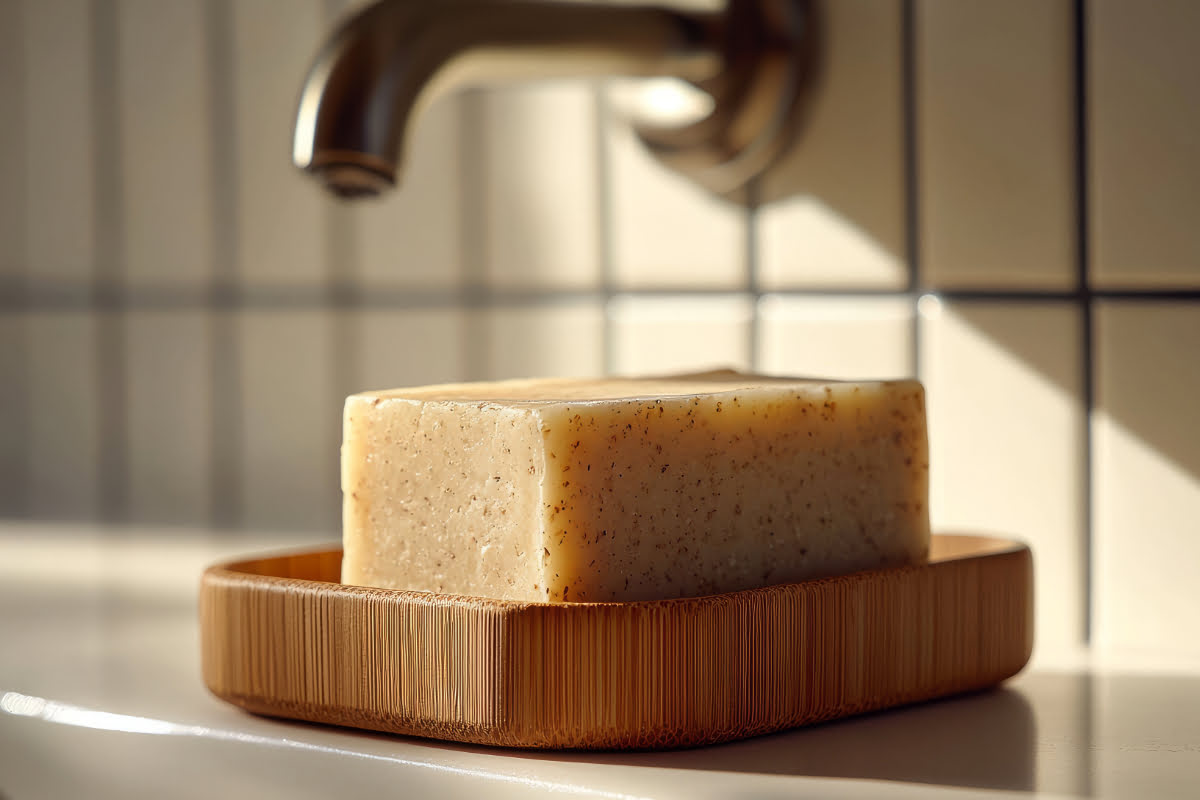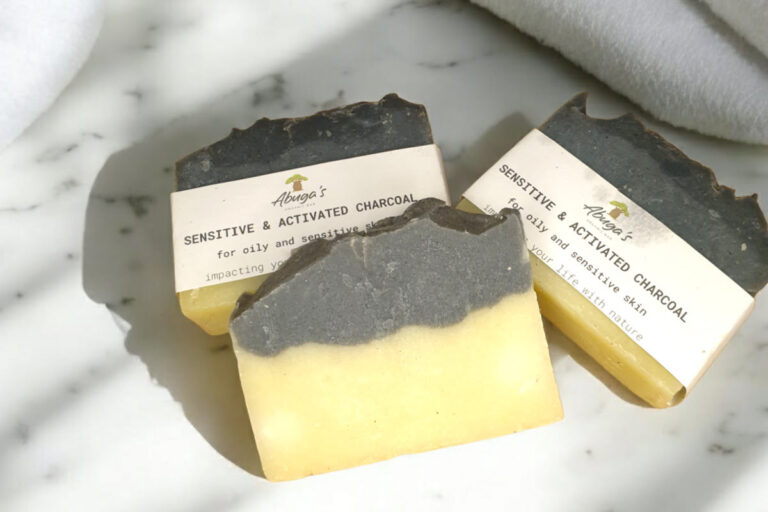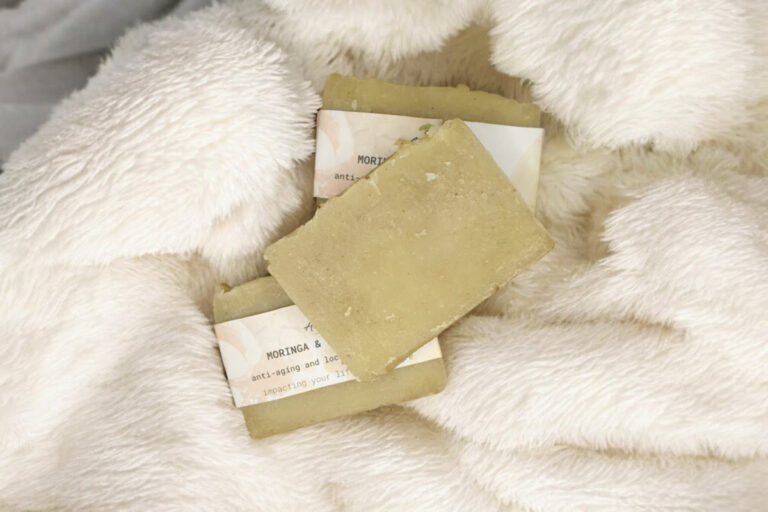Using organic soaps is like cultivating a lush garden—you need the right care for longevity. Most of my customers often feel discouraged by the higher cost of organic soaps. However, I’ve found effective strategies to extend their lifespan, ensuring you get the best value for your money.
1. Choose the Right Soap Dish
Investing in a high-quality soap dish can significantly prolong the life of your organic soaps. Choose one that drains water efficiently, like slotted, tilted, or wall-mounted options, to prevent your soaps from sitting in puddles.
A well-draining soap dish reduces the mushy residue and helps the soap dry properly between uses, thereby extending its lifespan.
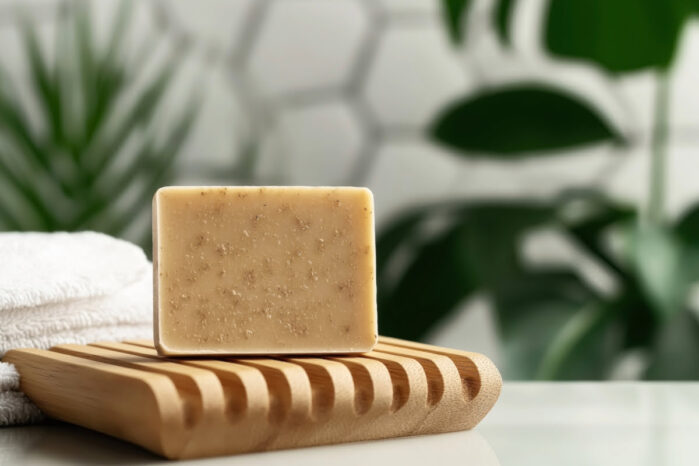
Use a Soap Saver
Soap savers not only help extend the life of your soap but also ensure you get maximum value from each bar.
Soap savers can help your organic soap last up to 50% longer, saving you money in the long run.
Investing in a quality soap saver is one of the simplest yet most effective ways to make your soap last longer. These handy devices allow for better drainage and aeration, preventing your soap from becoming soft and mushy.
Additionally, soap savers are easy to clean and maintain, ensuring your soap remains hygienic and effective for each use. By incorporating a soap saver into your routine, you’ll notice your soap stays solid and usable for much longer.
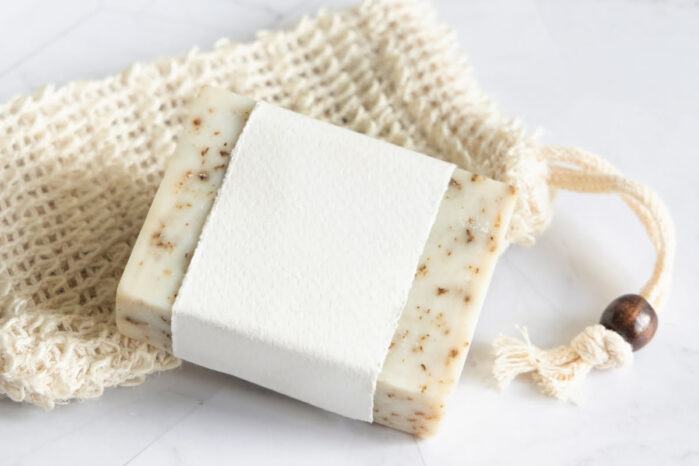
Proper Drainage
Ensuring proper drainage is crucial for prolonging the lifespan of your soaps. A soap dish with good drainage prevents your soap from sitting in water, which can quickly cause it to become soft and disintegrate.
So, it’s no exaggeration to say that proper drainage can make a substantial difference in how long your soap bars last. Look for soap dishes with slotted or raised designs that help water escape, keeping your soap dry and firm.
Some of my customers have found that using specific soap holders, designed for optimal drainage, can extend the life of their organic soaps by up to 3 weeks. This simple investment pays off over time, making your soaps more economical and long-lasting.
Remember, proper drainage not only extends the life of your soap but also ensures it remains dry, clean, and ready to use.
2. Store Soaps Correctly
Storing your soaps correctly is equally important in ensuring they remain firm and last longer. First, keep your soaps in a cool, dry place, away from direct sunlight, and high-humidity areas, to prevent them from melting or becoming mushy.
Consider using a soap-saver bag or wrapping them in breathable materials like muslin cloth to prolong their lifespan.
Keep Away From Water
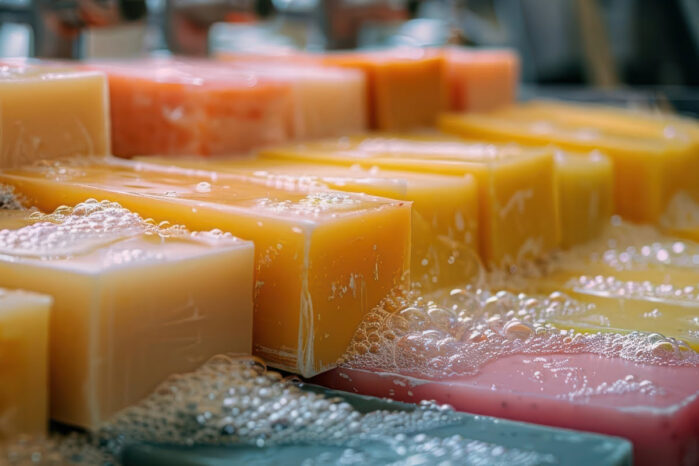
Water causes soap to dissolve quickly. That’s why keeping your organic soap away from water when not in use is crucial. Make a habit of removing your soap from the shower area or bathtub ledge, where it’s constantly exposed to splashes and moisture.
Instead, place it in a designated area where it can dry out completely, ensuring it stays firm and long-lasting. A dry environment extends longevity.
If your soap is continually exposed to water—no matter how luxurious and well-made it is, it won’t last long. To prevent this, consider investing in a compact, protective soap holder that shields it from unnecessary water exposure.
By doing so, you’ll notice a significant improvement in the durability and efficacy of your soaps. These small steps can ultimately lead to considerable savings in the long run and a satisfying, luxurious bathing experience.
Air-Dry Between Uses
Ensuring your soap air-dries between uses is crucial to extending its lifespan.
- Use a Soap Dish with Drainage Holes: This allows water to escape, preventing your soap from becoming mushy.
- Store on a High Surface: Keep your soap away from direct water streams and splashes while ensuring air circulation.
- Avoid Closed Containers: Trapping moisture speeds up dissolution. Opt for holders that allow airflow.
- Rotate Between Multiple Bars: Giving each bar ample time to dry completely helps them last longer.
- Wipe Off Excess Water: Lightly patting your soap dry can keep it firmer for a more extended period.
Drying between uses is essential for the longevity of your soap. A dry soap bar not only lasts longer but also retains its fragrance and texture better.
3. Cut Into Smaller Pieces
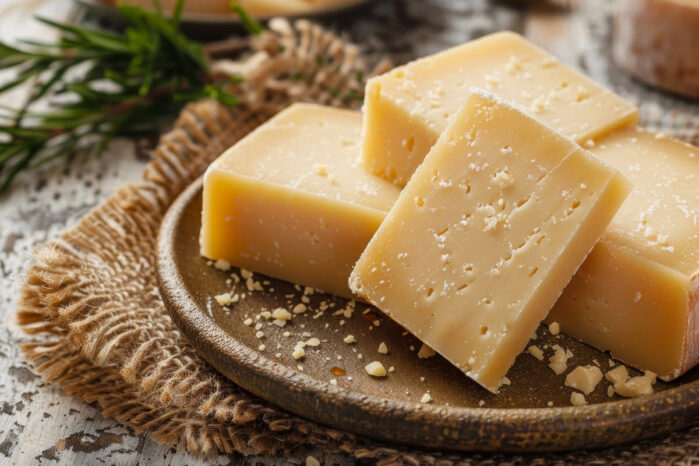
Cut larger bars into smaller pieces for specific, day-to-day use—this helps extend your soap’s lifespan and effectiveness. Smaller pieces dry quicker between uses, preserving the integrity of your organic soap and preventing waste from inadvertently dissolving larger pieces.
Moreover, faster drying time between uses ensures your soaps retain their efficacy for extended periods. Additionally, using small pieces helps preserve the remaining soap by reducing exposure to water and humidity.
Ever since I started using this approach and got my entire household in on it, I noticed our soaps lasting longer by as much as an extra month! Smaller pieces mean I have to use each piece to the very end. In turn, less soap goes unused or melts away in the water.
4. Optimal Usage Practices
To ensure you’re getting the most out of your soap, always lather using a washcloth or loofah. These materials create a greater surface area for lathering, thus requiring less soap, extending your soap bar’s lifespan. Avoid applying soap directly on your skin.
While at it, avoid letting your soap sit in standing water. Always use a soap dish with good drainage or, even better, a soap net to keep it dry between uses as I mentioned earlier in this post.
Avoid Over-Lathering
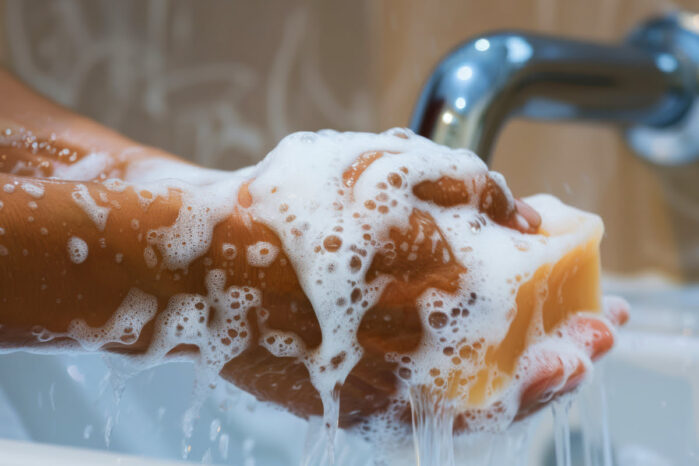
Use only the necessary amount of soap. Organic soaps from Abuga’s Organic Bar, are often more potent than commercial soaps. This means you need less soap to achieve the desired clean. Over-lathering not only depletes your soap bar faster, but it can also lead to the unnecessary wastage of what you’ve invested in.
Avoid using excessive pressure. Instead, adopt a gentle approach during lathering. Aim for a sufficient amount of bubbles to feel clean and refreshed, without drowning your body in foam.
Remember, our high-quality organic soaps are designed to provide efficient cleansing with minimal usage. So next time, ease up a bit, and you’ll find your soap will last significantly longer.
Alternate Between Bars
Since I started Abuga’s Organic Bar, I’ve been experimenting with different ways to make soaps last longer. One of the simplest yet most effective methods I discovered is alternating between two or more bars.
By rotating your soap bars daily, each bar gets ample time to dry out completely. This prevents them from becoming mushy, which usually happens when soap is left perpetually wet and reduces its life span.
Moreover, alternating between bars can add some variety to your bathing routine. Use one bar for a few days, then switch to another; this method can keep your skin from becoming too used to the same ingredients and helps you fully explore the different benefits of each unique formula.
So why not give it a try? Start alternating between a few bars of your favorite organic soaps and watch how much longer they last.
5. Maintaining Soap Quality
Properly maintaining your organic soaps is essential for preserving their integrity and maximizing their lifespan. Start by storing your soap in a well-drained soap dish to prevent it from sitting in water plus the following.
Avoid Direct Sunlight
Sunlight can cause soap to dry out prematurely, which leads to faster deterioration. Avoid placing your soaps on window sills or areas that get lots of sun.
Exposure to sunlight can also lead to color and scent loss, diminishing the delightful experience each soap bar is meant to provide. Natural oils within the soaps can become rancid when exposed to too much heat and light.
To maintain the exceptional benefits of your soaps, store them in a cool, dark place. This small adjustment can significantly extend their lifespan and ensure every bar remains as luxurious as the day you bought it. Make sure to explore our selection and follow these tips to enjoy long-lasting, high-quality soap experiences.
Store in Cool, Dry Places
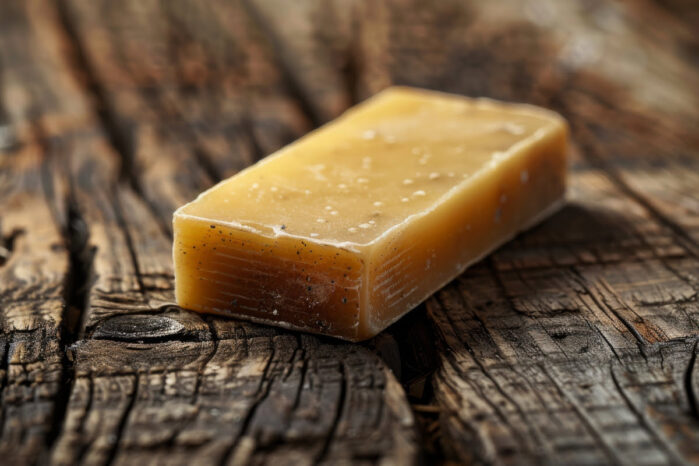
Storing your organic soaps in cool, dry places is crucial for maintaining their integrity and longevity. Excessive moisture can cause your soaps to become mushy or dissolve quickly, diminishing their effectiveness.
Humidity encourages the growth of mold and mildew, which can ruin your organic soaps. Bathrooms can be particularly problematic due to their humid nature, so consider storing your soaps outside these areas.
Instead, place your soaps in linen closets or on shelves away from damp environments to prolong their life. Using a soap dish with proper drainage can help too, as it ensures water doesn’t pool around the soap.
Remember, taking care of where you store your soap isn’t just about avoiding damage—proper storage keeps the soap’s beneficial ingredients effective for longer..
Why Organic Soaps Are Expensive
Organic soaps generally cost more due to several factors. The primary reason is the high cost of raw materials. Unlike conventional soaps that may use cheap, synthetic ingredients, organic soaps are made using premium natural ingredients.
These ingredients, sourced responsibly, contribute to the higher costs. Additionally, organic certification processes can be thorough and expensive, further driving up the price.
The quality of craftsmanship also contributes. In many cases, these soaps are handmade—an art that requires skill and effort to produce batches consistently. This artisanal touch typically results in small-scale production, increasing the costs.
The benefits of organic soaps, including gentler formulations and the avoidance of harmful chemicals, justify the pricing. When you buy from Abuga’s Organic Bar, you’re investing in your skin’s health and the environment. Visit my shop to explore my range of high-quality organic soaps.

